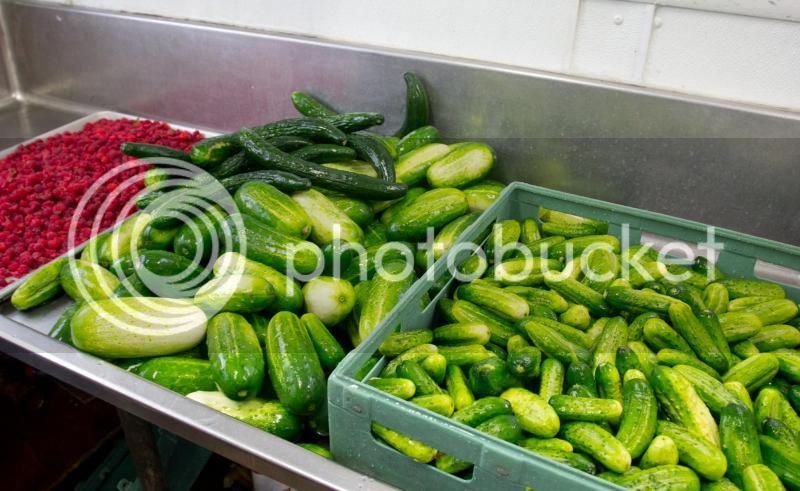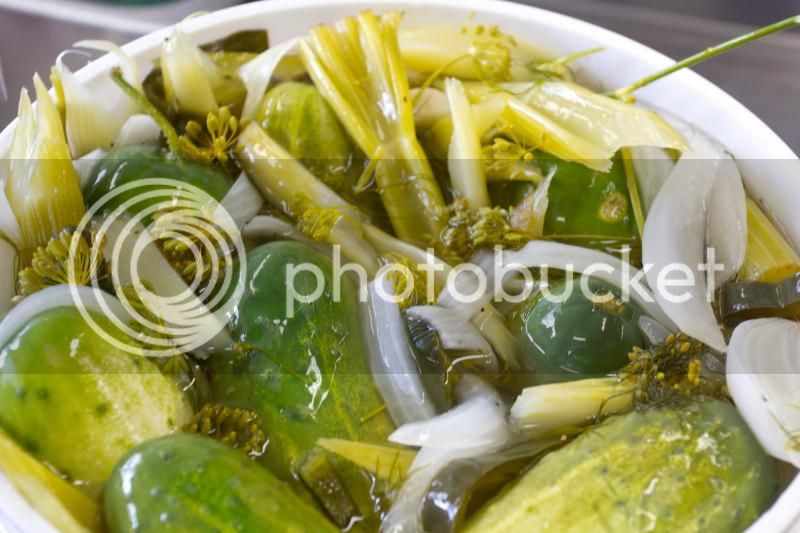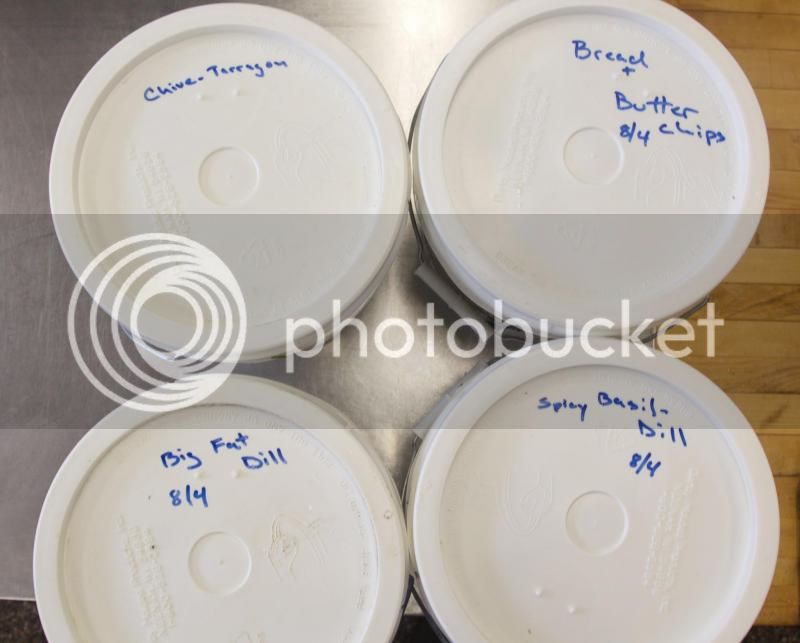You are using an out of date browser. It may not display this or other websites correctly.
You should upgrade or use an alternative browser.
You should upgrade or use an alternative browser.
Pickles
- Thread starter Salty dog
- Start date

Help Support Kitchen Knife Forums:
This site may earn a commission from merchant affiliate
links, including eBay, Amazon, and others.
i love pickles!
nice pics! what's your basic brine ratio? Do you heat the brine and cool it to room temp or do you dump it over the cukes while still somewhat hot? Just did about 6 qts of cherries a month ago, some blueberries, and most recently some beans and cucumbers. Gonna do some stem lettuce soon.
So far this summer I've made my two favorites. Fermented dill and pressure cooked vacuum sealed pickled beets.
I don't use any vinegar with the cucumbers. They're called half sour. Just salt, water, dill, some pepper corns, mustard seeds and pinch pepper flake. Leave on the counter for a few days in a containers that can breath. The refrigerate, takes about a week to get the brine all the way to the center.
For the beets, I pressure cook them for about 45 min, peel and process while their still warm. I use a mix of vinegars including balsamic. 1/2 water to 1/2 vinegar. For those that have a vacuum chamber with canning accessory (daveB and Danny) then seal the jars under hi pressure. Refrigerate. My girls eat them like potato chips. Their not so crazy about my pickles though. Too sour they say. I say yum!



I don't use any vinegar with the cucumbers. They're called half sour. Just salt, water, dill, some pepper corns, mustard seeds and pinch pepper flake. Leave on the counter for a few days in a containers that can breath. The refrigerate, takes about a week to get the brine all the way to the center.
For the beets, I pressure cook them for about 45 min, peel and process while their still warm. I use a mix of vinegars including balsamic. 1/2 water to 1/2 vinegar. For those that have a vacuum chamber with canning accessory (daveB and Danny) then seal the jars under hi pressure. Refrigerate. My girls eat them like potato chips. Their not so crazy about my pickles though. Too sour they say. I say yum!



I love really sour pickles. (Bubbies makes a decent, commercially available, product.) But have never made them myself. Is the sourness intensity primarily a function of the ingredients, e.g., brine concentration, or is it also controlled by the length of time the cucumbers are allowed to be exposed to the solution?
Larry, I'm a pickling amateur but from what I've read, the sour-ness is a function of how salty the water is (speaking only of non-vinegar brined cucumbers). More salt, more sour and everything else in the brine is just flavor.
http://www.creativesimplelife.com/probiotic-pickles/
http://www.creativesimplelife.com/probiotic-pickles/
Thanks for the link. Good details answering my question and explaining desired concentration for full sour. (As is the case with the writer of the item, I too am from NYC, and therefore I think I know what a good pickle should taste like. Of course many New Yorkers tend to think they know exactly what everything in the world should be like. I'm more restrained; I only think that about most food.)
Dardeau
Senior Member
- Joined
- Nov 19, 2012
- Messages
- 1,869
- Reaction score
- 32
If you go too far on the salt you kill the lactobacillus that is causing the sour taste. The sourness is more a function of how long you let the cucumbers ferment and what you use (if anything) as a starter culture. Making fermented pickles is very dependent on environmental factors.
Another important brine ingredient that is not just flavor is bay leaves or some other way to get tannins into your brine. This makes your pickles stay crisp.
There is a lost of advances reading on this stuff, but the best way to learn is hit the farmers market in August and make a lot of these. Then as cukes disappear go to carrots, radish, cabbage, etc. Change up your spices and make kimchi. Use zatar, and caraway, and pho spices. Then next summer ferment chilies with starter harvested from the first batch of cucumbers and make hot sauce. Make so much that you flood your friends and coworkers with unwanted kraut. This time next year you will know what works for you, your temperate zone, the bacteria in your home, and the taste buds of those you feed.
Another important brine ingredient that is not just flavor is bay leaves or some other way to get tannins into your brine. This makes your pickles stay crisp.
There is a lost of advances reading on this stuff, but the best way to learn is hit the farmers market in August and make a lot of these. Then as cukes disappear go to carrots, radish, cabbage, etc. Change up your spices and make kimchi. Use zatar, and caraway, and pho spices. Then next summer ferment chilies with starter harvested from the first batch of cucumbers and make hot sauce. Make so much that you flood your friends and coworkers with unwanted kraut. This time next year you will know what works for you, your temperate zone, the bacteria in your home, and the taste buds of those you feed.
"Dardeau," the linked recipe recommends a 5.4% (by their calculations; 3 tbsp. sea salt per quart of water -- I haven't checked their math) saline solution for full sour pickles. And oak, horseradish or grape leaves for tannins, but if bay leaves would also introduce tannins that would be easier for me.
Dardeau
Senior Member
- Joined
- Nov 19, 2012
- Messages
- 1,869
- Reaction score
- 32
That is a good salt to water ratio. It's just important to understand that the salt is there to inhibit the growth of some bacteria and molds so that others can flourish until they have enough of a foothold to repel unwanted strains.
In my experience fresh bay leaves work better as a way to get tannins in than the dried variety. And oak leaves, well washed, from the woods or park will work if you aren't into the laurel flavor. If you have a brewing supply store nearby you can get a bottle of liquid tannin additive for about five bucks. Sorrel, wood or otherwise is another good tannic additive but like the bay laurel, adds it's own flavor in addition to the tannic taste. If you go with a scavenged oak leaf go light. They are very tannic and will make the pickles unpleasant if you use too much.
You can call me Andre, Dardeau is my last name and doesn't need quotes.
In my experience fresh bay leaves work better as a way to get tannins in than the dried variety. And oak leaves, well washed, from the woods or park will work if you aren't into the laurel flavor. If you have a brewing supply store nearby you can get a bottle of liquid tannin additive for about five bucks. Sorrel, wood or otherwise is another good tannic additive but like the bay laurel, adds it's own flavor in addition to the tannic taste. If you go with a scavenged oak leaf go light. They are very tannic and will make the pickles unpleasant if you use too much.
You can call me Andre, Dardeau is my last name and doesn't need quotes.
Happy to call you Andre. (I used quotes not because I was using your last name, but because I was using your user name -- which of course also happens to be your last name.)
Appreciate the tannin tips. I'm just going to start very, very modestly, with a small batch, so am not going to hunt for a bottle of liquid tannin. (Though upon a quick search it looks like I could buy an ounce of tannin powder -- chestnut extract, used as a wine making additive -- on eBay for $2.75.) Easiest would probably be either dry bay leaves (don't even know where I would buy fresh ones), or a fresh, washed oak leaf (assuming even this kid from Brooklyn can identify one; I don't think the reputed tree that grows in Brooklyn was oak).
Appreciate the tannin tips. I'm just going to start very, very modestly, with a small batch, so am not going to hunt for a bottle of liquid tannin. (Though upon a quick search it looks like I could buy an ounce of tannin powder -- chestnut extract, used as a wine making additive -- on eBay for $2.75.) Easiest would probably be either dry bay leaves (don't even know where I would buy fresh ones), or a fresh, washed oak leaf (assuming even this kid from Brooklyn can identify one; I don't think the reputed tree that grows in Brooklyn was oak).
Larry you're very likely to find fresh bay laurel in the herb area of the grocery store in those little plastic containers. I'm lucky as I have two bays growing in the yard as ornamentals.
Dardeau
Senior Member
- Joined
- Nov 19, 2012
- Messages
- 1,869
- Reaction score
- 32
I would say that fresh bay is probably your safest bet. They have them at the Breaux Mart in Chalmette, LA, they'll have em anywhere. If you are in NY I'm pretty sure that Korin carries a pretty cool pickle fermentation jar that can sit on your countertop and is fairly cheap if you don't want to have a cheesecloth monstrosity. This is a really easy way to preserve and transform food.
I make bread and butter pickles most years (depending on the cucumber crop in my garden) and usually a batch of sweet "14 day" pickles. The bread and butters are easy -- slice them on our kraut cutter (giant madoline (sp) for shredding cabbage in industrial quantities), then add sliced onions and green peppers, soak in salt water a few hours, drain, add vinegar and sugar plus mustard seed, tumeric, and cloves. Heat to near boiling and can. Very tasty, I usually make a dozen quarts every year since the family raids my larder -- these pickles are the base for my Mother's excellent potato salad.
The "14 day" pickles are salt fermented for a week, then soaked in hot water, hot water with alum, hot water again, then a thick syrup with cinnamon sticks, cloves, and celery seed for a couple days, then canned. Very good, if horribly sweet.
I also make sauerkraut most years -- shred cabbage after removing the core, add a tsp of salt per quart and a tsp of sugar per quart if you like very sour kraut, while packing into a crock or other ceramic container -- no steel, but plastic is OK. Keep covered with water and a cloth and a weight (I use a dinner plate and a brick) to keep the cabbage submerged. If you don't, you get fruit flies and yeast growing, which is nasty. I then can it when it's sour enough.
Pickling is great!
Peter
The "14 day" pickles are salt fermented for a week, then soaked in hot water, hot water with alum, hot water again, then a thick syrup with cinnamon sticks, cloves, and celery seed for a couple days, then canned. Very good, if horribly sweet.
I also make sauerkraut most years -- shred cabbage after removing the core, add a tsp of salt per quart and a tsp of sugar per quart if you like very sour kraut, while packing into a crock or other ceramic container -- no steel, but plastic is OK. Keep covered with water and a cloth and a weight (I use a dinner plate and a brick) to keep the cabbage submerged. If you don't, you get fruit flies and yeast growing, which is nasty. I then can it when it's sour enough.
Pickling is great!
Peter
Mrmnms
Senior Member
- Joined
- Oct 11, 2012
- Messages
- 1,853
- Reaction score
- 7
Does anybody have experience using calcium chloride or alum to help jeep pickles crisp? I recall some folks using both as a kid. I don't. I was taught to scrape or remove the flower end of the Kirby cukes to help maintain crispness. Although a lower solution will work for half sours, when I was a kid, we had 2 crocks, one for full sours, one for half sours. 3 Tbls kosher salt per quart of water. The only difference was how long they sat out. I only are the full, full sours.
I've only ever done Chinese pickles...cut them and salt, then drain and rinse, then in a bath of vinegar with garlic, chili pepper, and a little sugar. Simple, but popular with just about everyone I've taught them to (though some say mine are on the sour/spicy side).
- Joined
- Feb 28, 2011
- Messages
- 3,580
- Reaction score
- 24
I like.
k.
k.
Keith Sinclair
Senior Member
Don't care much for pickles, but would love those raspberries...
Stefan
Those pickles look good. Stepan you must at least like Sauerkraut:Beersausage:
- Joined
- Feb 28, 2011
- Messages
- 4,070
- Reaction score
- 11
Just a language problem. For me, pickles = cucumbers and those I don't need in the 'classical' style - but love them in the Korean kim chee style. Definitely love sauerkraut, the carrot and daikon on a good banh mi sandwich, some nice daikon, beets etc. Also liked pickled cauliflour. Maybe I should go back reading this thread with a bit more attention to detail...
Stefan
Stefan






